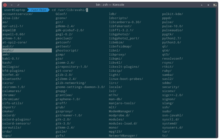
Bash, short for Bourne-Again SHell, is a shell program and command language supported by the Free Software Foundation and first developed for the GNU Project by Brian Fox. Designed as a 100% free software alternative for the Bourne shell, it was initially released in 1989. Its moniker is a play on words, referencing both its predecessor, the Bourne shell, and the concept of renewal.

A Unix shell is a command-line interpreter or shell that provides a command line user interface for Unix-like operating systems. The shell is both an interactive command language and a scripting language, and is used by the operating system to control the execution of the system using shell scripts.
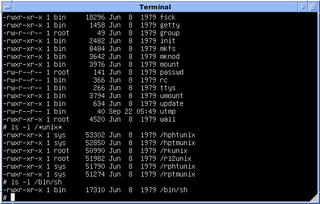
The Bourne shell (sh) is a shell command-line interpreter for computer operating systems.
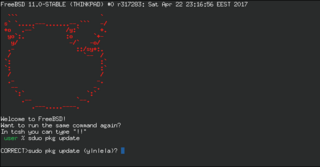
tcsh is a Unix shell based on and backward compatible with the C shell (csh).
Almquist shell is a lightweight Unix shell originally written by Kenneth Almquist in the late 1980s. Initially a clone of the System V.4 variant of the Bourne shell, it replaced the original Bourne shell in the BSD versions of Unix released in the early 1990s.

uname is a computer program in Unix and Unix-like computer operating systems that prints the name, version and other details about the current machine and the operating system running on it.
The command chown, an abbreviation of change owner, is used on Unix and Unix-like operating systems to change the owner of file system files and directories. Unprivileged (regular) users who wish to change the group membership of a file that they own may use chgrp.
In computing, touch is a command used to update the access date and/or modification date of a computer file or directory. It is included in Unix and Unix-like operating systems, TSC's FLEX, Digital Research/Novell DR DOS, the AROS shell, the Microware OS-9 shell, and ReactOS. The command is also available for FreeDOS and Microsoft Windows.
The Unix command su, which stands for 'substitute user', is used by a computer user to execute commands with the privileges of another user account. When executed it invokes a shell without changing the current working directory or the user environment.
nl is a Unix utility for numbering lines, either from a file or from standard input, reproducing output on standard output.

A command shell is a command-line interface to interact with and manipulate a computer's operating system.
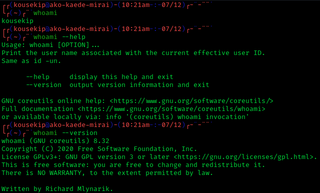
In computing, whoami is a command found on most Unix-like operating systems, Intel iRMX 86, every Microsoft Windows operating system since Windows Server 2003, and on ReactOS. It is a concatenation of the words "Who am I?" and prints the effective username of the current user when invoked.
MKS Toolkit is a software package produced and maintained by PTC that provides a Unix-like environment for scripting, connectivity and porting Unix and Linux software to Microsoft Windows. It was originally created for MS-DOS, and OS/2 versions were released up to version 4.4. Several editions of each version, such as MKS Toolkit for developers, power users, enterprise developers and interoperability are available, with the enterprise developer edition being the most complete.
UnxUtils is a collection of ports of common GNU Unix-like utilities to native Win32, with executables only depending on the Microsoft C-runtime msvcrt.dll. The collection was last updated externally on April 15, 2003, by Karl M. Syring. The most recent release package available as of December 2016 was an open-source project, UnxUtils at SourceForge, with the latest binary release in March, 2007. The independent distribution included a main zip archive complemented by more recent updates, but the SourceForge project has no UnxUpdates.zip package. An alternative source of Unix-like utilities for Windows is GnuWin32; it has later versions of many programs, but requires supporting files in many cases.
The Environment Modules system is a tool to help users manage their Unix or Linux shell environment, by allowing groups of related environment-variable settings to be made or removed dynamically.

In computer software, logname is a program in Unix and Unix-like operating systems that prints the name of the user who is currently logged in on the terminal. It usually corresponds to the LOGNAME variable in the system-state environment.
dirname is a standard computer program on Unix and Unix-like operating systems. When dirname is given a pathname, it will delete any suffix beginning with the last slash ('/') character and return the result. dirname is described in the Single UNIX Specification and is primarily used in shell scripts.
The script command is a Unix utility that records a terminal session. It dates back to the 1979 3.0 Berkeley Software Distribution (BSD).
The csplit command in Unix and Unix-like operating systems is a utility that is used to split a file into two or more smaller files determined by context lines.
On Unix-like computer systems, seq is a utility for generating a sequence of numbers.



